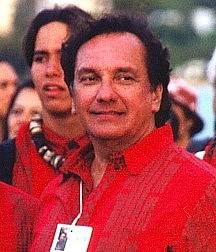Digital Collections
Celebrating the breadth and depth of Hawaiian knowledge. Amplifying Pacific voices of resiliency and hope. Recording the wisdom of past and present to help shape our future.
J. R. Kaha‘i Topolinski
Few contemporary haku mele are as adept as Kaha‘i Topolinski at embedding the kaona of their work in place-names, fragments of older mele, ‘ōlelo no‘eau, and powerful-but-enigmatic imagery. The underlying meanings of "‘O Pololū i ka Mālie" tap insistently, frustratingly, at the fringes of our ability to recognize and comprehend. We recognize Pololū as representative of the Kohala homeland from which so much of Kahaʻi’s poetry begins and to which so much of it is anchored. We recognize "kau keha" and "hi‘olani" as echoes of "Ke Welina mai nei ke Kini o Lalo." We identify the language of gliding canoes, no-splash diving, fish-baskets, and hand-nets as derived from proverbial expressions of expertise and physical attraction. And we mull over the triumph implicit in the imagery of light replacing dark, warmth overcoming cold, la‘i supplanting ha‘i. All told, we arrive at a sense—a vague but insistent sense—of the poet’s success (and subsequent relief?) at making-pa‘a a relationship, at validating a choice, at confirming his own skill and worth.
Ua kau keha ‘o Pololū i ka mālie
Hi‘olanilua i ka la‘i a Ehu ka ipo lele
Huli‘ole ka wa‘a loa ke holo i ka pohu
Hehi i ka pālahalaha a ka mālie
Like ka māla a Ka‘ala e waiho nei
Waiho nui ihola nō ka lā i laila
Mai Ha‘eha‘e nō a Lehua a ka welona
‘Opu ihola i loko o ka hīna‘i komo ‘ole
He maunu ‘ole nāna e ho‘owalewale
E komo ai ka i‘a kumu hei i ka ‘upena lima
Ha‘i ka nalu o Kalehuawehe ke hili wale lā nō
Ka‘a ka haka pō i kahi ko‘eko‘e
Lilo ka lā ka mehana i Mehana ka poli
Pololū rests on a pillow in the calm
A double peace is the place of Ehu the fleeting companion
No canoe is overturned when it sails in the calm
The sea lies smooth and peaceful
It lies as still as the garden of Ka‘ala
The sun shines, warming all below
From Ha‘eha‘e to the setting sun of Lehua
Vacant is the fish basket into which no fish enter
There is no bait to tempt them
So that the fish may be caught in a hand net
The wave of Kalehuawehe breaks, it rolls gently by
Passed into the night where it is chilly
Leaving the sun alone with its warmth of the bosom.
© J. R. Kaha‘i Topolinski, 2003

photo credit: Kīhei de Silva
Kumu hula John Renken Kaha‘iali‘i Topolinski, composer of "ʻO Pololū i ka Mālie," is descended, by koko, from the Kauauaamahi line of fiercely independent Kohala chiefs; he is descended, by instruction, from an equally unassailable line of tradition-keepers that includes Maiki Aiu Lake, Mrs. Patience Namaka Bacon, and Mary Kawena Pukui. Topolinski is best known for the powerful hula of his Ka Pā Hula Hawai‘i, for the elevated, courtly language of the mele he has composed, and for the uncompromising defense of his traditional and loyalist beliefs. Pictured with his student Kaleo Wong, Topolinski takes part in the closing parade and farewell ceremonies of the 8th Festival of Pacific Arts in Noumea, New Caledonia.